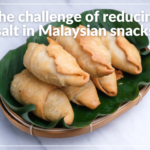Why is reducing salt so difficult?
Salt is challenging to remove as it plays multiple roles in foods. In fact, reducing salt makes food less appealing because it also decreases the taste intensity. Morevover, salt impacts the price of the final product. It is an “inexpensive way” to enhance food flavor. Therefore, the complications behind salt reduction are challenging for the food producers. They are under pressure by regional health program initiatives.
WATCH OUR
WEBINAR!
Regional health concern
The World Health Organization has placed official recommendations for achieving a 30% reduction of the population’s dietary salt intake by 2025. Thus, many countries in APAC have started developing their own salt reduction programs. For example, ‘Eat Right India’ Movement was launched by Authority of India (FSSAI) in July 2018. The Australia Department of Health also implemented a salt reformulation program in 2020 with a target of 27 food categories. And in 2021, salt tax is expected to be implemented in Thailand.
Salt reduction is an opportunity for food manufacturers

Awareness of salt reduction is growing. Encouraged by changing consumer expectations and new regulations, food manufacturers are reformulating to reduce salt. Indeed, this trend showed growth for reduced salt claims across most food segments in this region. In 2021, the snack category had the highest percentage of product launches with a reduced salt claim (24%). It was followed by sauces and seasonings (17%) and processed meat and meat substitute products (8%). Thus, reformulating for salt reduction brings an opportunity for innovation and promoting of products to new consumers, such as the elderly or younger generations. However, it raises the question “how can we reduce salt without compromising the taste”?
Biospringer offers dedicated yeast extract solutions for reformulation challenges

Our new portfolio of dedicated yeast extract solutions provides food producers and innovators the key to breakthrough salt reduction challenges by achieving up to 30%* less salt. Indeed, these products are specifically designed to boost taste and manage sodium content by reinforcing the salty perception. They achieve a balanced flavor profile by boosting specific flavor nuances. These solutions can be used across many food segments from snacks, sauces, and seasonings to highly processed plant-based meat alternatives. Our salt reduction solutions include Springer® Umami range of yeast extracts. These yeast extracts contain amino acids, nucleotides and peptides. They work together to intensify salt perception, reinforce the taste, and provide long-lasting performance.
Solutions to reduce salt in a wide range of applications
We successfully developed solutions in a wide range of applications:
1. We achieve 20% salt reduction in flavored snack seasoning (chicken, shrimp) by boosting the flavor notes and richness.
2. We attain 30% reduced salt in dipping sauces (light soy sauce, seafood soy sauce) by increasing the original notes, such as fermented and pungency.
3. We reduce 20% of the salt in instant noodle seasonings (tonkatsu, chicken) by intensifying the meaty flavor profile.
4. We obtain 15% less salt in meat substitute products through the enrichment of meaty profile (chicken, beef).
To discover more about this challenge,
*indicates variation with application and ingredient matrix, please contact your local Biospringer representative for information relevant to your region.









